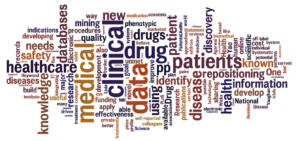Health Informatics, A Fast-Growing Field and a Crucial Skill-Set: An Interview with Dr. Patrick Casimir
June 1, 2015
What is Health Informatics?
What discipline combines information technology, programming, analytical skills, communication abilities, and a deep desire to improve healthcare quality and safety?
Health Informatics. Health Informatics encompasses the management (acquiring, storing, retrieving, and utilizing) of healthcare information to foster better collaboration among a patient’s various healthcare providers, and plays a critical role in the push toward healthcare reform. In the field of health economics and outcomes research (HEOR), health informatics is integral in the utilization of data to explore and analyze interventions, systems, and processes that affect patient health outcomes in real-life and theoretical situations.
Tremendous Growth in Health Informatics Field
Over the past several years, the growth in electronic health record (EHR) adoption as well as “meaningful use” incentive programs from the Centers for Medicare and Medicaid have been a catalyst in the growth in the health informatics field. As more and more providers and health systems implement EHR, and seek to drive improved outcomes to maximize reimbursement, health informatics specialists will be in high demand.
Health Informatics should not be confused with Health Information Technology. Health Informatics is the application of informatics concepts, theories, and practices to healthcare, and is “the science, the how, and the why, behind health IT”, as stated by the Centers for Disease Control and Prevention. Recognition of the growing complexity of health information needs has led to a call for the creation of a new health care professional. Health Informaticists are asked to forecast for demand in pharmaceuticals for providers and networks, devise datasets to deal with the uncertainty of the implementation of the Affordable Care Act, and help to bring together data for providers and payers to better understand how patients are faring within their system with their protocols. It is a discipline that has a place for a strongly analytical “techie”, or a highly communicative “people person” who is focused on patients, the healthcare system, and their care providers.
Infographic by USF Health Online.
Interview with a Newly-Formed Health Informatics Master’s Degree Program
In an effort to better understand this burgeoning new career path, HealthEconomics.Com interviewed Dr. Patric Casimir, Program Director and Assistant Professor of the newly formed Health Informatics program at Jacksonville University at the Brooks Rehabilitation College of Health Sciences of Jacksonville University, located in Jacksonville, Florida. We asked Dr. Casimir to share his vision of health informatics education, including the type of work that is done and the external drivers in society and health policy that have caused this explosive growth in the field. Below is the interview with Patrick Casimir [PC], by Dr. Patti Peeples, CEO and Founder of HealthEconomics.Com.
[PP] Please describe some of the major national trends in the Informatics field, and provide some context to how this profession is growing in importance in the US and internationally?
[PC] The major national trends that have affected the field of health informatics include the use of new technologies such as electronic health records (EHRs), computerized provider order entry (CPOE), as well clinical decision support systems (CDSS). Other trends affecting this field are explosive growth in data analytics and management, as well as mobile health. It is essential to also consider the impact of the trend toward value-based healthcare payment structures (tracking particular interventions and determining outcome, asking “is it working?” “how well is it working?” and “is it cost-effective”. There is also a focus on quality metrics by all organizations, because of new rules in reimbursement. The implementation of clinical information systems and health informatics in general has been critical in saving patients’ life through the reduction of medication errors and the detection of harmful drug allergies, interactions, and adverse dosing events. Health Informaticists also play crucial roles in assessing healthcare quality and providing the data to better understand how organizations can provide quality care in the most effective and efficient way possible given their particular patient population and treatment paradigms.
[PP] What kinds of jobs and companies do Health Informatics professionals work within today, and will they work in within the next 5 years? And, who are some of the team members in the type of projects that Health Informatics professionals work on (that is, who do they work with to “get the job done”)?
[PC] The types of individuals health informatics professionals work with are quite vast. Typically, right now you will see them working for hospitals and other healthcare related organizations such as insurance companies or data analytic companies. Commonly, health informatics professionals work with nurses, physicians, CNOs, CIOs, CEOs, project managers, and medical health services researchers. As the field matures, our data capabilities get more extensive, and the demand for data analysis grows, the types of organizations and jobs will only increase, and the impact of this type of work will continue to grow and be leveraged within the organization up through the C-Suite.
[PP] Can you tell us a little more about the faculty in Jacksonville University Masters of Science Health Informatics program? What kinds of work experience do the other professors have and how will this practical experience be brought into the classroom?
[PC] We are recruiting faculty in the JU Health Informatics program with an emphasis on experienced health informatics professionals, health services outcomes researchers, and academicians who have taught in this discipline and in related disciplines for many years. By example, I will direct the program and teach as professor and I’ve been a long time healthcare consultant. Since 2010, I’ve worked as a Health Information Technology (HIT) application analyst, consultant, and CPOE implementation expert at the following hospitals and medical centers across the nation, including Kingman Regional Medical Center, Kingman AZ; Hamilton Medical Center, Dalton, GA; Mountain States Health Alliance, Johnson City, TN; Community Health Systems, Scranton, PA; Arkansas Heart Hospital, Little Rock, AR; Garden City Medical Center, Garden City, MI; Peconic Bay Medical Center, Riverhead, NY; Southeast Medical Center, Cape Girardeau, MO; Baptist Health South Florida, Coral Gables, FL. As an HIT expert, I’ve helped and supported small hospitals and large regional health care systems transitioning to electronic medical records, implemented computer provider order entry (CPOE), and embarking on true clinical systems’ integration for meaningful attestation.
I’ve also taught as an Adjunct Professor of the Master Science Biomedical Informatics program at Nova Southeastern University since 2010. As an Adjunct Professor, I taught and developed numerous courses and used his industry experience to help graduate students identify and complete appropriate practicum and research projects within hospitals, other healthcare organizations, and the HIT field in general. I’ve been spending the past several months interviewing and building this JU program to be a significant force in the health informatics field in Florida and nationwide.
[PP] What additional resources are there in Jacksonville/North Florida that can be utilized for the graduate students to avail themselves of, both personally and professionally?
[PC] The Jacksonville/North Florida is a powerhouse in terms of highly respected, world class healthcare facilities, including the Mayo Clinic Hospital, Shands, Baptist Medical Center, Memorial Hospital, Brooks Rehabilitation, Florida Blue, and St Vincent Medical Center to name a few. The presence of such highly esteemed research and patient care hospitals and provider networks will give ample opportunity for practical real-life training and internships, as well as future job opportunities. In addition, Jacksonville is a city in high growth as the arts are infusing every walk of life, and of course, the beautiful St. Johns River, the intracoastal waterway, and the Atlantic ocean beaches offer tremendous recreation for students and their families. The cost of living is low, and it is a welcoming city with southern hospitality but a big city + beachy feel. Nowhere else offers this combination of experiences other than Jacksonville and the First Coast.
To learn more about Jacksonville University’s Master’s Degree in Health Informatics, please click here.










